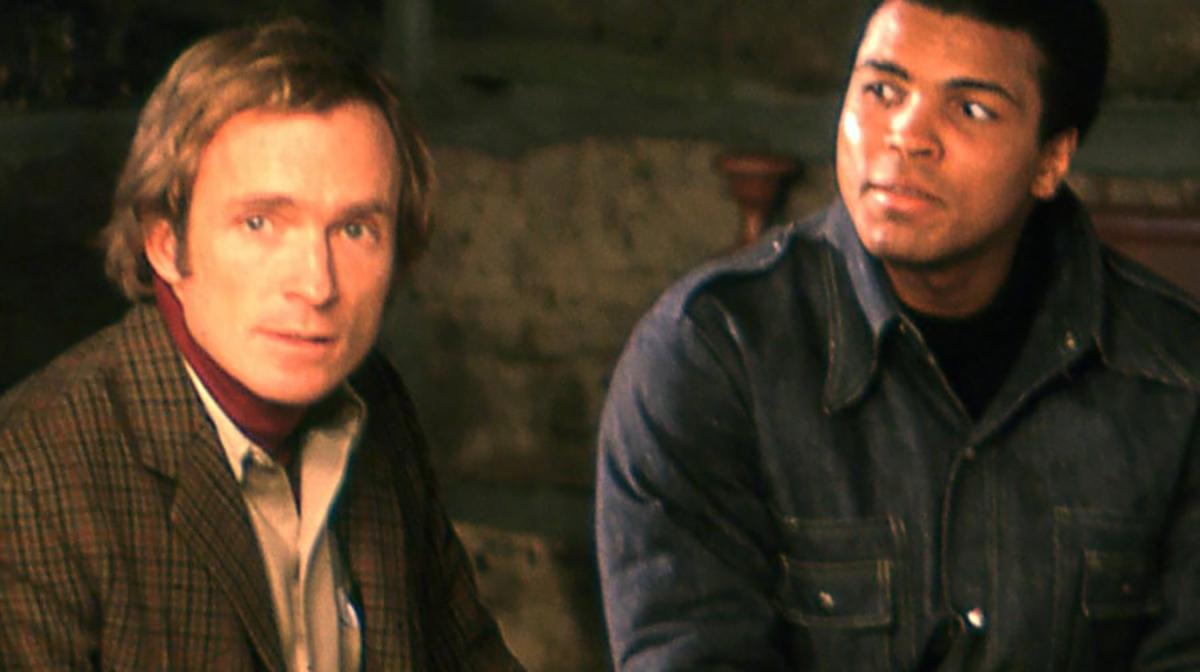The tried and true “archival footage + talking heads” documentary formula works, and good documentarians know how to swing that formula without sacrificing filmmaking’s visual component. Pick your interviewees. Choose your locations. Compose your shots. Light the frame properly. Find the right rhythm of cutting the archival material with your interviews. Rinse, lather, repeat. Sometimes, though, doing everything technically right doesn’t make for an exciting movie, and in those times the problem is content.
That’s “Ali & Cavett: The Tale of the Tapes” in a nutshell. Robert S. Bader‘s film, detailing the relationship between talk show host Dick Cavett and the boxer, activist, and all around American patriot Muhammad Ali, is by no means marred by undisciplined filmmaking. Bader’s craftsmanship is rock solid. It’s in carving out a narrative where he stumbles. Bader fails to tell much of a story or find an angle, on his two subjects, instead taking the path of least resistance by covering broad swaths of history at the expense of hyper-specificity. This is a pretty way of saying that “Ali & Cavett: The Tale of the Tapes” tells us little we wouldn’t be able to figure out by cracking a book about Ali, and if you haven’t, Bader sits down with more than a few people who have authored those books, so at least you’ll walk away from the film with an expanded reading list.
Not that Bader shouldn’t have bothered approaching experts on Ali, Cavett, and their relationship, mind you. The real issue is that mining their knowledge in service to a macro overview of Ali’s career, Cavett’s career, and what drew these men together for over a dozen appearances on “The Dick Cavett Show” over the span of 53 years feels like a waste of energy. Each of them is able to offer only so much insight into Ali as a boxer, as a man, as a political entity, and as an advocate for social justice. Put together under the umbrella of one sub-90 minute movie, and their observations wind up saying less, not more. With this learned a panel of authorities, you’d expect “Ali & Cavett: The Tale of the Tapes” to surprise us with new revelations. If nothing else you’d expect the film to exude freshness.
Somehow, it’s as stale as the multiplex popcorn left overnight on closet shelves. Give Bader a time machine and “Ali & Cavett: The Tale of the Tapes” might have been a success; released in the mid-90s, the film’s messages, lessons, and vast acumen about its stars and the eras it covers would have read as new. But Muhammad Ali is a well-documented figure, in documentaries (a la “The Trials of Muhammad Ali,” “I Am Ali,” and “When We Were Kings“) and in fiction (Michael Mann‘s”Ali,” which is quite arguably cinema’s most definitive Ali text). If you’ve seen these movies, then you won’t find much here you don’t already know.
“Ali & Cavett: The Tale of the Tapes” wants to find its way to viewers who haven’t seen other Ali movies, and who lack the necessary foundation for contextualizing his life and times. In that regard, at least, the film works; it’s loaded with information, maybe too much. Bader’s problem is timeliness. He was beaten to the punch. There’s no reason that should be the case, either. For the most part, the movies have ignored – perhaps “overlooked,” if we’re charitable – Ali’s bond with Cavett, which gives “Ali & Cavett: The Tale of the Tapes” a perspective absent from the Ali canon.
So seeing the footage, watching Ali and Cavett interact and josh with one another, beginning as professional acquaintances and ending as friends, gives us a window into their lives that we’ve otherwise missed out on. This new take just makes Bader’s choice to look away from that window as often as he does even more puzzling. If you need a new framing device for Ali’s legend, “The Dick Cavett Show” is about as good as you can hope for, maybe even better. Had “Ali & Cavett: The Tale of the Tapes” fully embraced that device as its focus instead of treating it as a lens for reexamining the whole of Ali’s evolution, the film could have been something.
The device does gift us with moments of interplay between Ali and Cavett, and those moments speak to their camaraderie, to the common humanity they shared with each other. It’s the glue that bounds them together. Bader’s film addresses the gulf of difference in their backgrounds, and in doing so communicates the idea that we all must seek out said common humanity in one another, to find the values we all hold dear as Americans and as people, and in finding those values find unity as well. As handsome as this sentiment is, though, it’s muddled by the film’s totality. (There is a terrific bit of footage featuring Lester Maddox, the Governor of Georgia from 1967 to 1971, who stormed off the set of “The Dick Cavett” show when Cavett slyly equated Southern bigots with Maddox voters; the ordeal is discussed as a triumph against racism, and helps drive home the film’s overarching belief in harmony.)
Most of all the film gives us Cavett himself. As the man who knew Ali best, Cavett is a living, breathing testament to Ali’s character; he can tell us more than any historian, any book, and even any amount of television tape could ever hope to. And he does. But “Ali & Cavett: The Tale of the Tapes” never lets him tell the whole story on his own. The rest of its elements feel like crutches foisted upon a project that doesn’t actually need them. Bader’s film is commendable in its thoroughness, but its failure to capitalize on Cavett’s experience screams “missed opportunity.” [C]
Click here for all our coverage from the 2018 SXSW Film Festival.





